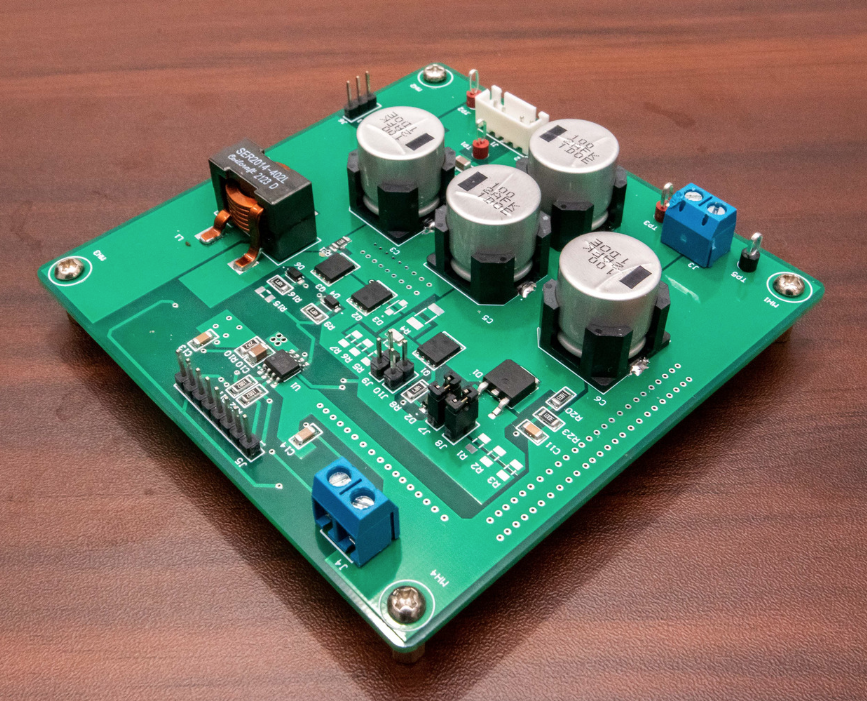This blog post is dedicated to demonstrate the project of University of Moratuwa for the IEEE International Future Energy Challenge 2022, which is a prestigious power electronics competition sponsored by IEEE Power Electronics Society, IEEE Industry Application Society, IEEE Power and Engineering Society and Power Systems Manufacturers Association.
The Team – Team UoM
Advisors
- Prof. Udayanga Hemapala
- Dr. Subodha Charles
- Mr. Thilina Ambagahawaththa
- Mr. Iresh Jayawardana
Members
- Pahan Mendis (Team Leader)
- Chathuni Wijegunawardana
- Pamuditha Somarathne
- Punsara Mahawela
- Ransara Wijitharathna
- Supun Kuruppu
- Biyon Fernando
- Hiruni Wijewardena
- Limalka Sadith
- Nikeshi Kumarasinghe
- Nawanjana Yesith
- Geshan Sudasingha
- Dineth Mudalige

Overview
The International Future Energy Challenge competition for the year 2022 was launched back in the end of 2020. The task for this competition was to design a Smart, Efficient and Light Solar Microgrid Inverter for the following set of specifications.
Project – Smart, Efficient and Light Solar Microgrid Inverter
| Grid Voltage | Single-Phase and Three-Phase Universal AC Input , 50-60 Hz |
| Solar Input Voltage | 30-60V (48V DC) |
| Output Power | 1 kW at Vin=50V |
| Reactive Power Compensation | According to the given graph |
| Grid Current THD | <2% at 1kW |
| Power Factor | >0.99 at 1kW |
| Efficiency | >=95% at 1kW |
| Cooling | Natural or forced convection |
| Protection | OCP, OVP, SCP, OTP |
| Safety | Galvanic Isolation |
The participation was only open for the undergraduate teams and on proposal basis. The interested teams had to submit a proposal to the competition chairs before 31st of October, 2021 to enter the competition. Each proposal was judged by a distinguished panel of volunteer experts from the IEEE and the industry.
This year’s competition promoted the use of wide-band gap semiconductor devices based on GaN or SiC to increase the efficiency and the performance. This was a huge chance for the teams to explore an emerging technology such as the wide-band gap semiconductors.
Our Journey
Proposal Submission
The journey started when we, Pahan and Chathuni, heard about the IEEE International Future Energy Challenge(IFEC) from Mr.Iresh Jayawardana, who is a senior and a previous participant in the competition, back in July 2021. We immediately got interested in this project as it aligned well with our interests in electronic design and because of the keen enthusiasm we had to initiate a hardware project where they put our knowledge into action. We decided to form a team from our colleagues at the Dept. of Electronic and Telecommunication Engineering. This team consisted of Pahan, as the team leader, Chathuni, Pamuditha, Punsara, Ransara, Dineth, Hiruni and Mudith. Mr.Iresh connected the team with Mr.Thilina Ambagahawaththa, who was a lecturer at the department at that time and, through him, Prof. Udayanga Hemapala who was the head of the Dept. of Electrical Engineering and an expert in microgrid design.
Even though the team was very motivated, we were facing a challenge. By the time we started our work, the competition has been going on for almost a year and they only had 3 months to catch up with the other competing teams. Also, we had very little reference to follow, to come up with a proposal with the potential to get accepted, as no previous team from Sri Lanka has managed to do so.
Nevertheless, we started researching about inverter design, learning everything about power electronics from the start and drafting their proposal. At the beginning, we had so many doubts about designing an inverter, how it is controlled and how to present a proposal that would convince the judges. With the help of Mr.Iresh and Mr.Thilina, we set out a plan to come up with a circuit that would achieve the given set of specifications through research and compile a simulation as a verification for the proposal.
As a solar microgrid inverter, we defined the system to consist of two main parts and sub sections.
- MPPT Tracker
- Circuit
- Controller
- Inverter
- Circuit
- Controller
The team divided into two sub-teams to work on each of these parts.
Together, we came up with the following system specifications.
| Inverter Topology | Three-phase two-level voltage source inverter topology |
| Maximum Power Point Tracking | Incremental conductance methodology |
| DC-DC Conversion | Synchronous boost converter |
| Filtering | Band-pass LCL filter |
| Inverter Control | Space vector pulse width modulation technique |
Accordingly, we compiled a simulation in MATLAB-Simulink that would verify our design decisions.

Using these results, we wrote a very comprehensive proposal in LaTex an submitted by 31st of October.
All of this was new to us, not things we had learned in our academic work. It was challenging, learning about something all by ourselves. There were times when we wondered whether we would even be able to figure out a working design strategy to present in the proposal. We had so many questions, new things to find and figure out. However, what kept us going was the our love to learn something new. It was never about winning, it was about what we learned on the way.
Semi-final Competition
To much of our surprise, we received news that our proposal has been accepted by early December. All-together 13 teams from all over the world has been selected to the semi-final round with us. This was already a huge achievement for us. Now, the real work had to begin.
We decided to expand our team, because now it was the time for us to actually develop our proposed design. We needed many hands on deck. So, we invited Supun, Biyon, Limalka, Nikeshi, Nawanjana and Geshan. Additionally, we invited Dr.Subodha Charles, who is a lecturer at the Dept. of Electronics and Telecommunication Engineering, as an advisor to the team. We were all getting ready for the semi-final round.
The task for the semi-final round was to present our progress of the hardware development and its performance in a 15-minute presentation, which will be followed by an QnA session with judges. This was scheduled to be held on 25th of March, 2022. So, we had nearly 4 months to make some impressive progress.
But the problem was, we still did not have sufficient knowledge about how the controller of the inverter should be designed. We were kind of discouraged and doubtful. The research that were available were not sufficient for us to design this controller to behave as required. The point that we started to figure things out properly was an online short course on Udemy. This course gave us all the necessary knowledge that we needed to design a custom controller to our requirement.
At the end of the 4 months, we presented the following presentation during the virtual semi-final round in March.
Our design was refined from the initial design in the proposal in some aspects. We modified the DC Boost Converter into a LLC DC-DC Converter. The filtering after the inverter was proposed to be done using a three-phase choke filter, instead of the previous LLC filter. These design decisions were taken after much research and analysis.
The maximum power point PCB was designed, consisted of a synchronous, as well as an asynchronous boost converter, which can be chose using a jumper as needed. This circuit was used to evaluate the performance of both circuits and choose the synchronous converter as our best choice. The MPPT control algorithm was verified by carrying out a MATLAB simulation.
Also, a printed circuit board was designed for the LLC Circuit proposed.
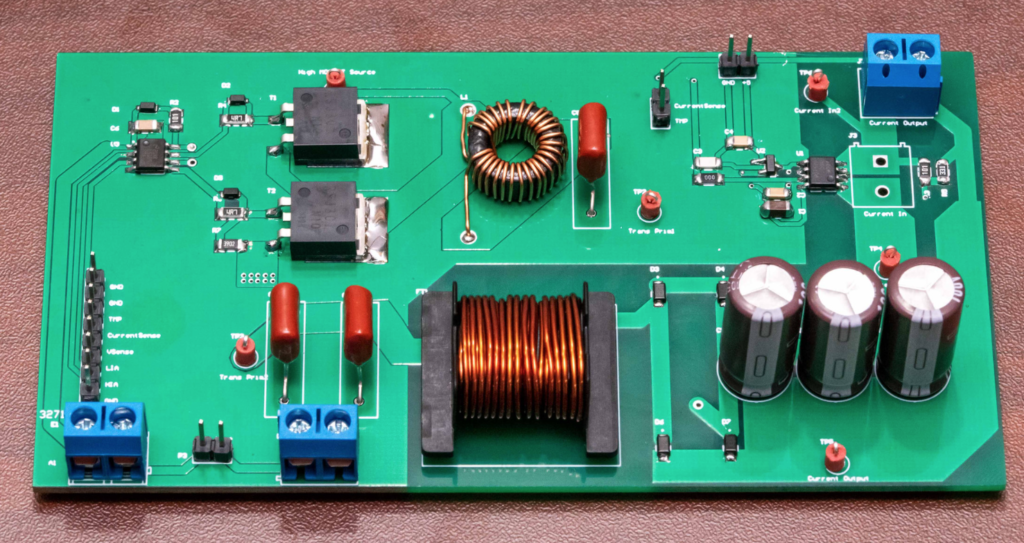
Inverter testing was carried out by a low-power H-Bridge circuit using PWM signals synthesized by an FPGA. The whole system was controlled by a C2000 microcontroller.

Inverter Testing
Again, we received good news that we had been selected into the grand finals of the competition and that the judges were much impressed by our team’s presentation.
The Final Competition
The final competition was to be held between 27th-29th of July, 2022. we had a little more than 3 months to complete our project. Our strategy was to gradually increase the power delivery of our implementations and test.
We were given details about how the testing will be carried out in the final competition, so we refined our designs accordingly. As the Maximum power point tracking is not going to be tested, we focused on the LLC DC-DC Converter Design and the Inverter Design.
We designed two variations of the LLC DC-DC converter circuits which involved a transformer design which was hand wound by us.

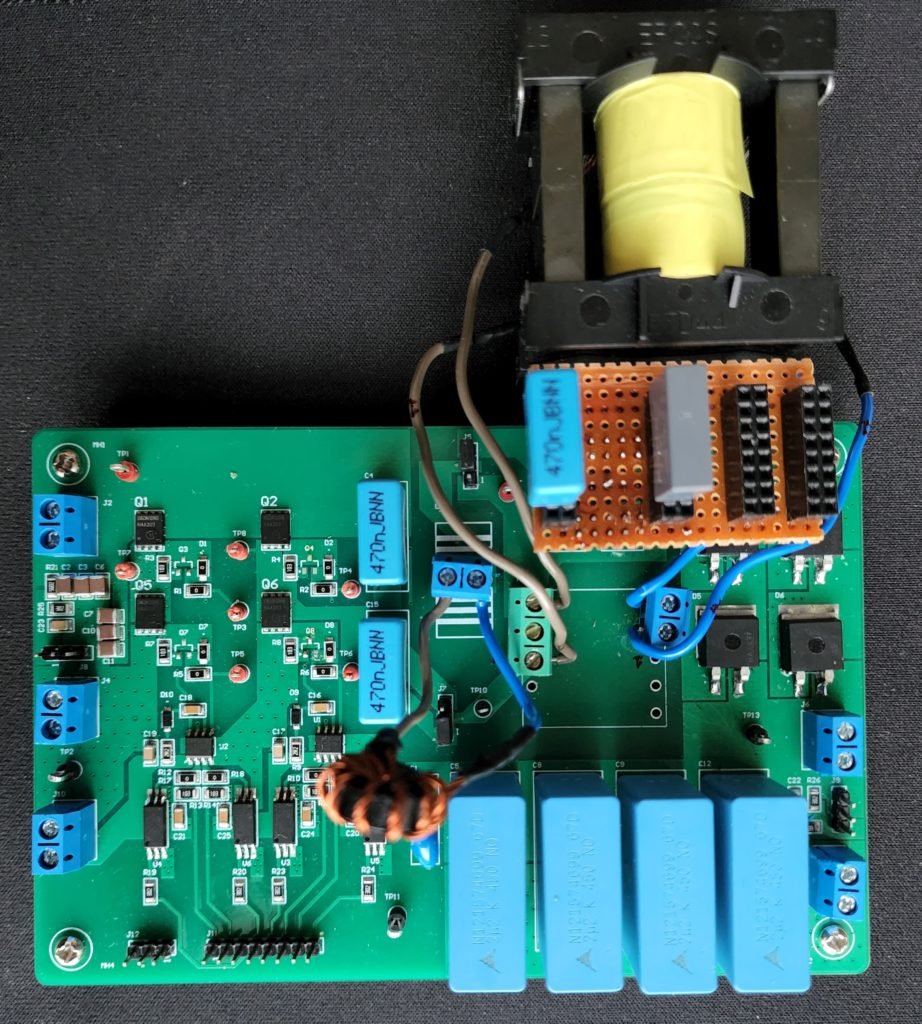

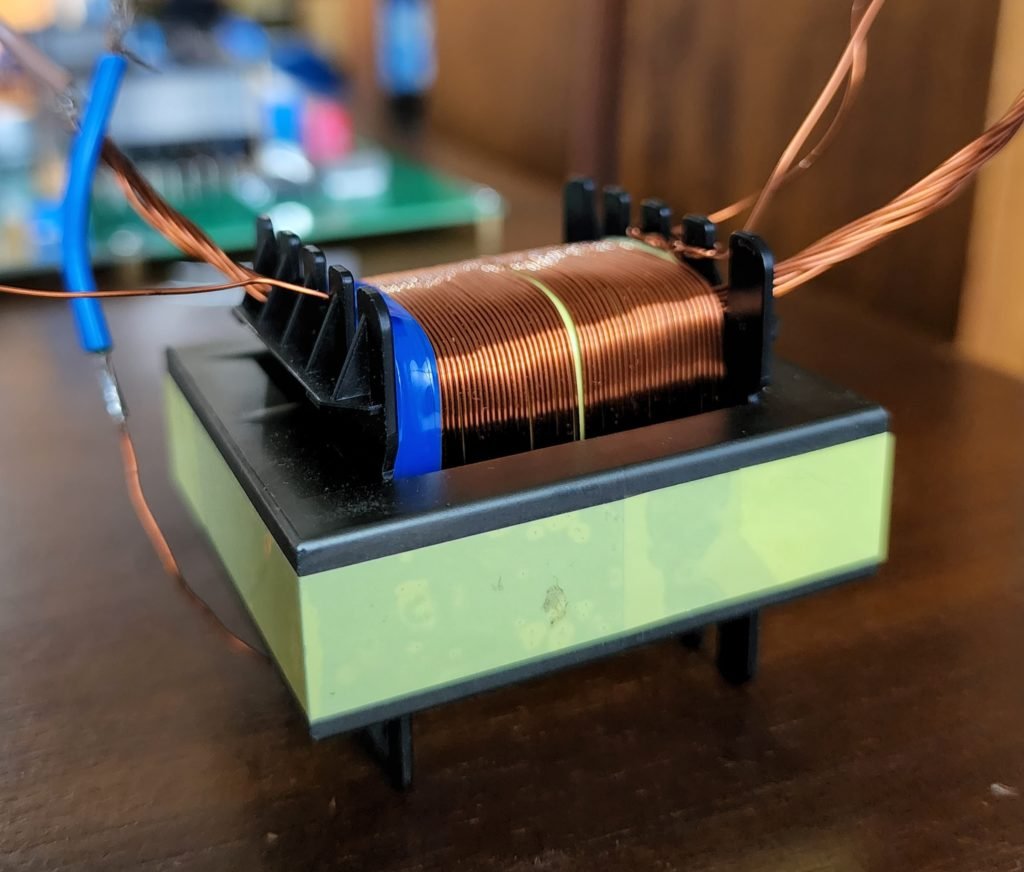
Out of these two designs, the version 2 circuit, which contains a full bridge circuit and is controlled by pulse frequency modulation was much stable.
The design approach we used for the inverter was unique.
One of the most important parts of the inverter was the sensing. Current and voltage sensing was crucial for proper control of the inverter. We first designed individual modules for current, voltage and temperature sensing. We had to go through several design iterations, using different sensing ICs.
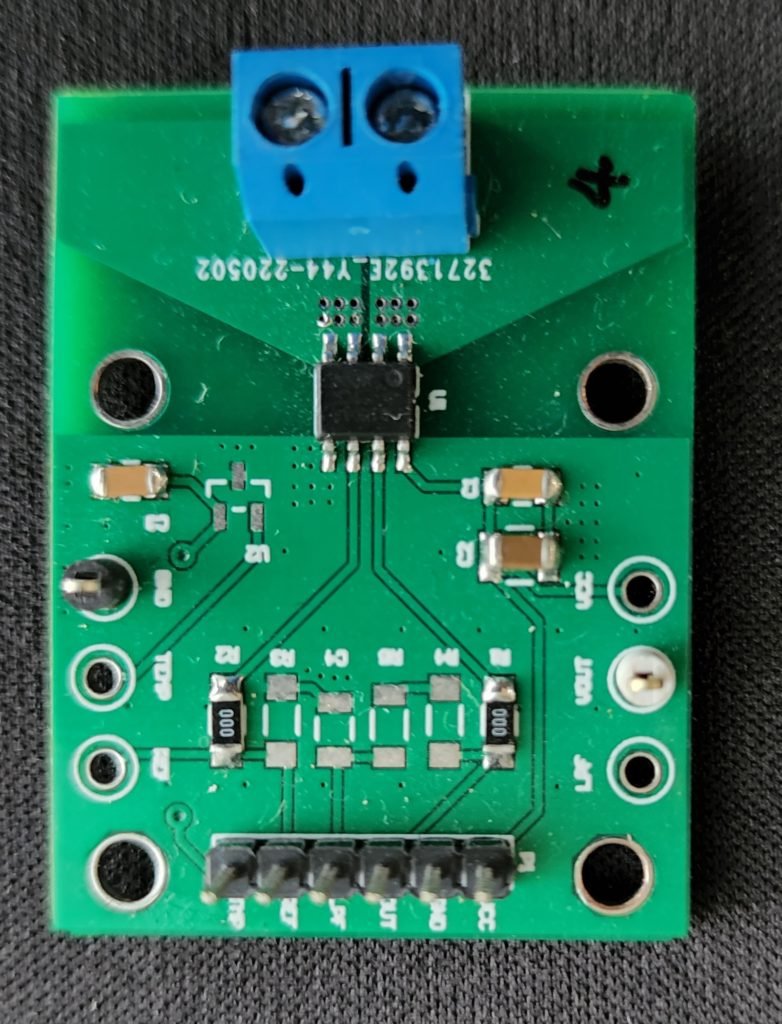

Then, we designed a base board containing all the sensing circuits and power circuits need for the inverter switching. This PCB was designed in 4-layers, taking isolation, power integrity and signal integrity into account. The H-Bridge were designed to be pluggable in to this base board. This allowed us to upgrade our H-Bridge circuit along with the power delivery while keeping the base board the same.

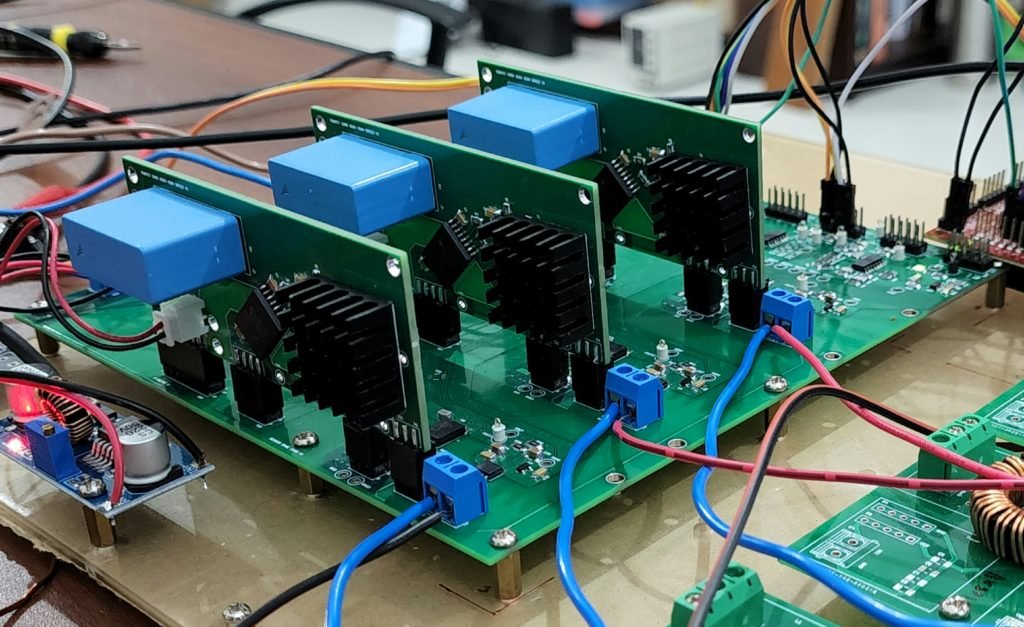
Four H-Bridge card were designed for incrementing power delivery and one that contains wide-band gap semiconductors. Out of these 4 PCBs, 3 were fabricated, assembled and tested. All of these H-Bridge circuits included isolation between the high-power circuit components and the other components.


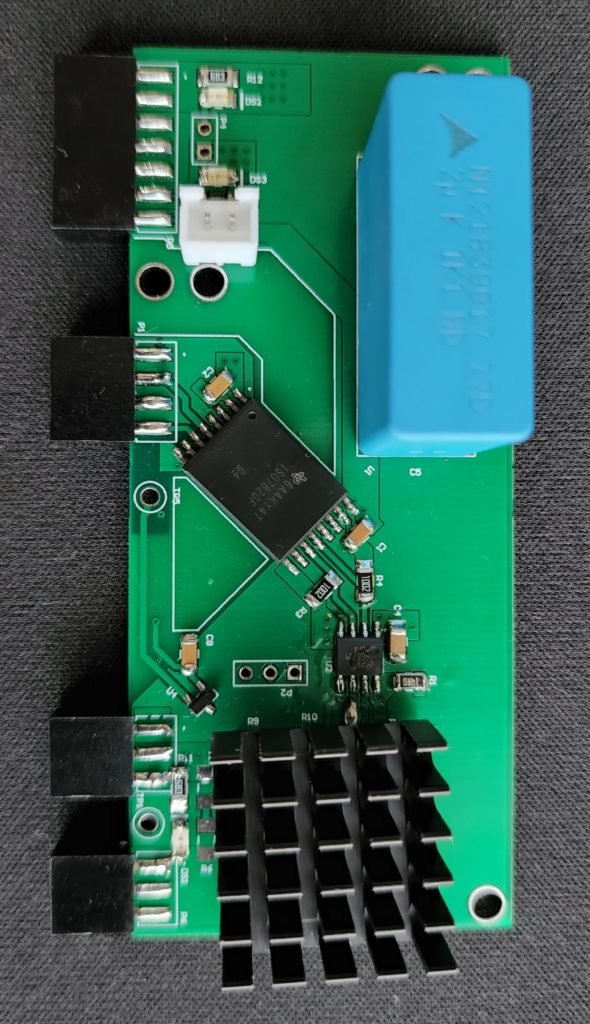

Despite the progress that we made, we were unable to reserve flight to participate in the competition, because by the time we received our visa, the flight fares had gone up drastically. We also experienced delays in our PCB and component order deliveries due to the limited flight availability to Sri Lanka. We were doing all this project development during a economic crisis, going through hours long power cuts and rising inflation.
When we informed the competition organizers about our situation, they offered us the chance to present our progress in a 20-minute video presentation. They said that they had been worried themselves, whether we would be able to attend, after hearing about the news from Sri Lanka. They also mentioned that they were impressed about our team’s performance in the competition so far.
This video had been played in front of the audience during the final competition which was held between 28th to 30th of July.
We are very grateful for the opportunity the competition organizers gave us by considering our situation. Also, as a team, we are very satisfied with the knowledge and experience that we gained through this project about power electronics, PCB design, hardware testing and debugging. We designed this inverter from scratch, without using any off-the-shelf modules and we consider what we achieved to be truly remarkable. And we are pleased to be the first team from Sri Lanka to get our proposal accepted and progress through to the final competition of the IEEE International Future Energy Challenge.
Task Delegation
| Team Member | Task Undertook |
|---|---|
| Pahan Mendis | Inverter Circuit Design – Base board and H-Bridge Cards LLC Circuit Version 1 – PCB Design Soldering |
| Chathuni Wijegunawardana | Inverter Circuit – Component Selection PCB Assembling Project Management |
| Pamuditha Somarathne | Inverter Controller Design and Programming Inverter and LLC Controller Tuning LLC Circuit Research |
| Punsara Mahawela | MPPT Circuit Design LLC DC-DC Circuit Design and Simulation Soldering |
| Ransara Wijitharathna | Inverter Controller Tuning Transformer Design and Winding MPPT Controller |
| Dineth Mudalige | Literature Review LLC Circuit Research |
| Nikeshi Kumarasinghe | Project Management Documentation |
| Supun Kuruppu | Inverter Controller Tuning Inverter PLL and Protection Implementation MPPT Controller |
| Biyon Fernando | Inverter Controller Tuning Inverter PLL and Protection Implementation MPPT Controller |
| Hiruni Wijewardena | MPPT Design Research on Protection LLC Simulation |
| Limalka Sadith | MPPT PCB Design LLC Simulation Hardware Testing |
| Nawanjana Yesith | Choke Filter Selection Grid Services Transformer Research |
| Geshan Sudasinghe | Choke Filter Selection Grid Services Transformer Research |


